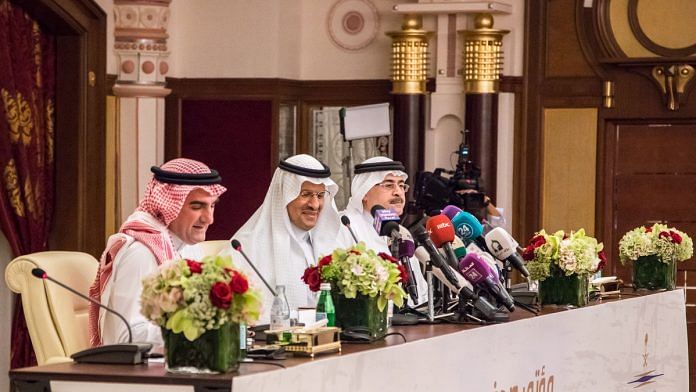New Delhi: US government officials told media outlets Tuesday that the recent drone and cruise missile attacks on Saudi’s major oil infrastructure were carried out from southern Iran. They also mentioned that Saudi’s air defense systems had failed to detect the cruise missiles because they were pointed “southwards” to prevent attacks from Yemen.
For nearly a decade now, Saudi Arabia and Iran have been indulging in proxy wars across Syria, Iraq and Yemen. But the recent developments have urged analysts to consider the prospect of a more direct confrontation between the two Middle Eastern powers.
What do we know about the attacks?
Following the attack on the state-owned oil giant, Saudi Aramco’s facilities, Iran-backed rebels in Yemen, the Houthis had claimed responsibility for the attack. Given the sophistication and precision of these strikes, however, most experts are unsure about the direct involvement of the Houthis’.
In the past couple of days, US President Donald Trump and his Secretary of State Mike Pompeo had blamed Iran for the attacks. The Iranian government, in the meanwhile, has denied any involvement.
A US official had told CBS News that an American team is currently present in Abaqaiq, the site of the attack in Saudi Arabia. This team would conduct an analysis of the wreckage and present “a very compelling forensic case” about Iran’s involvement, said the official.
The targeted oil facility was responsible for about five per cent of the global oil supply. In the immediate aftermath of the attack, oil prices were disrupted.
Was Iran responsible for the attack?
While the US government had claimed that the missiles were launched from Iran, some experts have argued that the Trump administration has not provided sufficient evidence.
There has, however, been a spate of attacks on international shipping tankers across the Persian Gulf. The US and its Gulf allies have blamed Iran’s Revolutionary Guards (the Iranian Army) for these incidents.
Given an aggressive turn in Iran’s foreign and security policy of late, analysts haven’t altogether discarded the possibility of a more direct Iranian involvement in the Saudi Aramco attack.
Writing for The Washington Post, Ishaan Tharoor argues that the severe US sanctions on Iran has crippled the country’s economy and “probably convinced some officials in Tehran of the utility of carrying out asymmetric acts of sabotage that rattle neighbors and raise the geopolitical stakes in the region.”
Measured response, but escalation a possibility
While the US seems to squarely blame the Iranian-regime for the Saudi attacks, there have been voices against it. According to a report in the Foreign Policy, different arms of the US National Security Administration is divided on whether the US should get more involved in the Middle East.
For now, the Trump administration appears to be mulling over the idea of deploying more troops in the region.
Jeff Martini, an analyst with the Rand Corporation, argues that at some point the US would have to acknowledge that deterrence against Iran is not working anymore. He says that “if intelligence analysts can ‘credibly’ show these missile strikes came from Iran, Washington will have to consider a kinetic strike.”
Others say that regardless of the scale of these attacks, a direct US-Iran war remains unlikely. Given that both the leaderships and people in both Iran and the US want to avoid costly wars, there might also be a diffusion of tensions.
The Saudi leadership, in the meanwhile, has said that it is capable of responding to the attacks.
If conclusive evidence of a direct Iranian involvement surfaces, analysts also argue that the possibility of a Saudi retaliation remains a possibility.
“We’re not dealing with common sense here. We are dealing with the fact that the Saudis have to retaliate one way or the other. Otherwise the position even of the crown prince would be seen as weak in the country and at this point he doesn’t have many friends even in his own country at the higher level,” Jean-François Seznec of Georgetown University told The Guardian.



